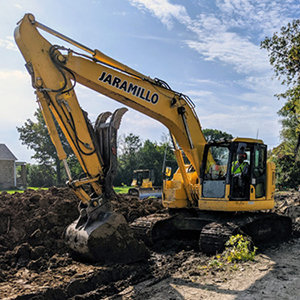Septic Ohio - Comprehensive Septic System Providers in Ohio
Septic Ohio - Comprehensive Septic System Providers in Ohio
Blog Article
Comprehensive Excavation Methods: Understanding the Basics for Success
The cautious planning, precise execution, and precise focus to detail called for in excavation tasks demand a comprehensive approach that encompasses numerous basic aspects. The real mastery exists not just in understanding these fundamentals but in effortlessly incorporating them to navigate the complexities of excavation jobs with skill.
Understanding Excavation Job Planning

Successful excavation jobs are improved the foundation of precise and thorough preparation. The first stage of any excavation task is the planning phase, where crucial decisions are made that can dramatically affect the outcome of the task. During this stage, it is vital to gather all pertinent details concerning the site, including topographical surveys, dirt composition, and any type of potential threats that might exist. Recognizing the task range, timeline, and budget restrictions is critical for developing a detailed excavation plan that makes sure the job's success.
One key facet of excavation task planning is the growth of a detailed timeline that details the sequence of turning points, tasks, and target dates. By carefully considering all these aspects during the planning phase, excavation projects can be implemented efficiently and effectively, leading to effective end results - lancaster trenching.
Soil Analysis and Website Evaluation
Conducting detailed soil evaluation and website evaluation is a vital action in the preparation stage of any type of excavation task. Dirt analysis includes identifying the structure, structure, and buildings of the soil at the excavation website. This information is vital for recognizing the soil's bearing capacity, moisture content, and potential for erosion, which are key consider identifying the excavation techniques and tools required for the task.
Website examination exceeds soil evaluation and encompasses a broader assessment of the general site conditions. This analysis includes determining any type of prospective hazards, such as underground energies, environmental concerns, or unstable terrain, that could impact the excavation process. By completely evaluating the site, project managers can create effective excavation methods that focus on security, efficiency, and environmental management.
Using sophisticated modern technologies like ground-penetrating radar, soil tasting, and drone studies can improve the precision and effectiveness of soil evaluation and site assessment. Investing time and resources in these preliminary actions can eventually save time and protect against expensive delays or complications during the excavation process.
Tools Selection and Usage
Effective excavation tasks depend greatly on strategic tools option and application to guarantee optimal performance and productivity. Picking the ideal equipment for the job is crucial in making best use of effectiveness and decreasing downtime. Elements such as the type of dirt, deepness of excavation, and project scope play a significant function in establishing the most suitable devices for the task available.

In addition to picking the proper devices, appropriate use is vital to job success. Operators should be educated to manage the devices safely and successfully - dump truck companies in ohio. Regular maintenance checks and timely repairs aid prevent breakdowns and guarantee regular efficiency throughout the job
Security Actions and Rules Compliance
In the realm of excavation tasks, focusing on safety and security actions and compliance with laws is paramount to making certain a secure and lawfully audio functional environment. Precaution include a variety of techniques, consisting of carrying out detailed site assessments, applying correct signage and barriers, and supplying sufficient safety training for all personnel associated with the excavation procedure. Adherence to guidelines, such as OSHA needs in the United States, makes sure that the excavation task fulfills the necessary requirements to safeguard employees, spectators, and the surrounding atmosphere.

Monitoring Progression and Adjusting Methods
Just how can predict managers properly track the innovation of excavation tasks and adapt their strategies as necessary to maximize end results? Tracking development is essential for making certain that excavation projects remain on track and satisfy deadlines. Task managers can use numerous tools and strategies to track progress, such as day-to-day development records, regular site evaluations, and progressed monitoring innovations like drones and GPS tracking systems. By continuously keeping an eye on the task's innovation, supervisors can recognize any kind of prospective hold-ups or problems early on and take aggressive procedures to address them.

Verdict
To conclude, grasping the fundamentals of thorough excavation strategies is vital for the success of any type of job. By understanding task planning, evaluating dirt and website conditions, choosing appropriate devices, adhering to security laws, and monitoring progression, task managers can make sure a smooth and effective excavation process. Carrying out these strategies will certainly lead to effective end results and lessen possible dangers or setbacks during the excavation project.
The preliminary stage of any excavation job is the planning stage, where crucial decisions are made that can considerably affect the end result of the job. Comprehending the job extent, timeline, and budget plan constraints is important for developing an extensive excavation plan that makes sure the task's success.
How can project managers effectively track the development of excavation projects and adapt their approaches accordingly to optimize outcomes? By carefully keeping track of progress and being ready to adapt techniques, job supervisors can enhance the total success of excavation projects.
By comprehending task planning, assessing soil and website problems, choosing proper devices, abiding with safety and security guidelines, and checking progression, task managers can guarantee a reliable and smooth excavation process.
Report this page